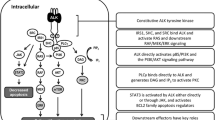Summary
In the era of personalized medicine, the identification of driver mutations has paved the way towards targeted therapy. With the identification of anaplastic lymphoma kinase (ALK) as an oncogenic driver mutation, ALK rearrangements became druggable by tyrosine kinase inhibitors and, thus, have improved the prognosis for patients. Nevertheless, these approaches are limited by resistances occurring within the first or second year of administering ALK inhibitors. Among the different ALK resistant mutations, G1202R is the most common mutation, located in the kinase domain of the ALK protein resulting in resistance to treatment with the first- and second-generation kinase inhibitors (e.g., crizotinib, ceritinib, brigatenib and alectinib). Conflicting reports exist regarding the efficacy of lorlatinib, a next generation ALK inhibitor. The aim of this study is to access the potential impact of lorlatinib as a second-line treatment for a metastatic progressive NSCLC disease harboring genomic alteration of ALK G1202R, an AKLi-resistant mutation. The case of a patient with advanced lung cancer and the mentioned mutation is described.




Similar content being viewed by others
References
Sharma GG, Mota I, Mologni L, Patrucco E, Gambacorti-Passerini C, Chiarle R. Tumor resistance against ALK targeted therapy-Where it comes from and where it goes. Cancers. 2018; https://doi.org/10.3390/cancers10030062.
Motegi A, Fujimoto J, Kotani M, Sakuraba H, Yamamoto T. ALK receptor tyrosine kinase promotes cell growth and neurite outgrowth. J Cell Sci. 2004;117(15):3319–29. https://doi.org/10.1242/jcs.01183.
Shaw AT, Engelman JA. ALK in lung cancer: past, present, and future. j Clin Oncol. 2013;31(8):1105–11. https://doi.org/10.1200/JCO.2012.44.5353.
Young LC, Takeuchi K, Soda M, et al. Identification of novel isoforms of the EML4-ALK transforming gene in non-small cell lung cancer. Cancer Res. 2008;68(13):4971–6. https://doi.org/10.1158/0008-5472.CAN-07-6158.
Shaw AT, Kim DW, Nakagawa K, et al. Crizotinib versus chemotherapy in advanced ALK-positive lung cancer. n Engl J Med. 2013;368(25):2385–94. https://doi.org/10.1056/NEJMoa1214886.
Friboulet L, Zou H, Kodack DP, et al. Abstract 130: PF-06463922, a novel next generation ALK/ROS1 inhibitor, overcomes resistance to 1st and 2nd generation ALK inhibitors in pre-clinical models. 2015;28(1):130–130. https://doi.org/10.1158/1538-7445.am2015-130.
Solomon BJ, Besse B, Bauer TM, et al. Lorlatinib in patients with ALK-positive non-small-cell lung cancer: results from a global phase 2 study. lancet Oncol. 2018;19(12):1654–67. https://doi.org/10.1016/S1470-2045(18)30649-1.
Kao CC, Parulekar AD. Spotlight on fevipripant and its potential in the treatment of asthma: evidence to date. J Asthma Allergy. 2019;12:1–5. https://doi.org/10.2147/JAA.S167973.
Li W, Sparidans R, El-lari M, et al. P‑glycoprotein (ABCB1/MDR1) limits brain accumulation and Cytochrome P450-3A (CYP3A) restricts oral availability of the novel FGFR4 inhibitor fisogatinib (BLU-554). Int J Pharm. 2020;573:118842. https://doi.org/10.1016/j.ijpharm.2019.118842.
Mologni L, Ceccon M, Pirola A, et al. NPM/ALK mutants resistant to ASP3026 display variable sensitivity to alternative ALK inhibitors but succumb to the novel compound PF-06463922. Oncotarget. 2015;6(8):5720–34. https://doi.org/10.18632/oncotarget.3122.
Redaelli S, Ceccon M, Zappa M, et al. Lorlatinib treatment elicits multiple on- and off-target mechanisms of resistance in ALK-driven cancer. Cancer Res. 2018;78(24):6866–80. https://doi.org/10.1158/0008-5472.CAN-18-1867.
Bauer TM, Felip E, Solomon BJ, et al. Clinical management of adverse events associated with lorlatinib. Oncologist. 2019;24(8):1103–10. https://doi.org/10.1634/theoncologist.2018-0380.
Mogenet A, Tomasini P, Greillier L, Barlesi F. Lorlatinib: An additional option for ALK-positive non-small cell lung cancer? Transl Lung Cancer Res. 2019;8(13):S383–S6. https://doi.org/10.21037/tlcr.2019.05.10.
Shaw AT, Friboulet L, Leshchiner I, et al. Resensitization to crizotinib by the lorlatinib ALK resistance mutation L1198F. N Engl J Med. 2016;374(1):54–61. https://doi.org/10.1056/NEJMoa1508887.
Edelman MJ, Hodgson L, Rosenblatt PY, et al. CYFRA 21‑1 as a prognostic and predictive marker in advanced non-small-cell lung cancer in a prospective trial: CALGB 150304. J Thorac Oncol. 2012;7(4):649–54. https://doi.org/10.1097/JTO.0b013e31824a8db0.
Author information
Authors and Affiliations
Corresponding author
Ethics declarations
Conflict of interest
L. Hempel, J. Molnar, A. Gaumann, S. Robert, J. Scheiber, A. Kleespies, K. Riedmann, S. Schreiber, B. Gandorfer, A. Piehler and D. Hempel declare that they have no competing interests.
Ethical standards
All procedures performed in studies involving human participants or on human tissue were in accordance with the ethical standards of the institutional and/or national research committee and with the 1975 Helsinki declaration and its later amendments or comparable ethical standards. Informed consent was obtained from all individual participants included in the study.
Additional information
Publisher’s Note
Springer Nature remains neutral with regard to jurisdictional claims in published maps and institutional affiliations.
Rights and permissions
About this article
Cite this article
Hempel, L., Molnar, J., Gaumann, A. et al. Detection of acquired resistance mutation ALK G1202R after treatment with alectinib and response of lorlatinib. memo 14, 386–391 (2021). https://doi.org/10.1007/s12254-021-00724-2
Received:
Accepted:
Published:
Issue Date:
DOI: https://doi.org/10.1007/s12254-021-00724-2



